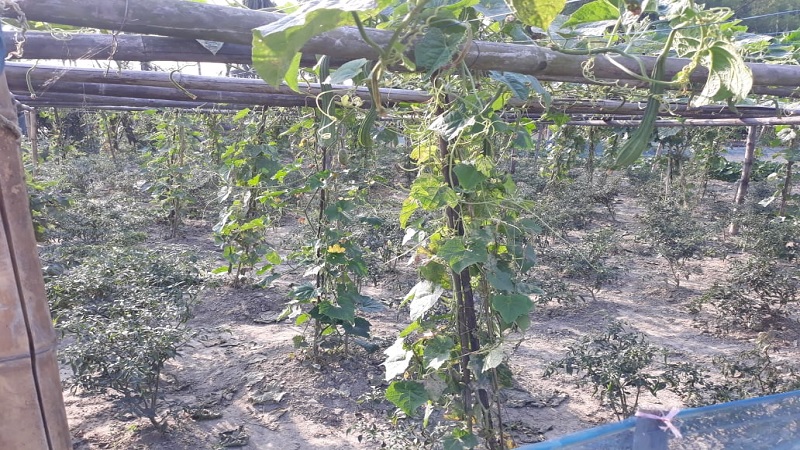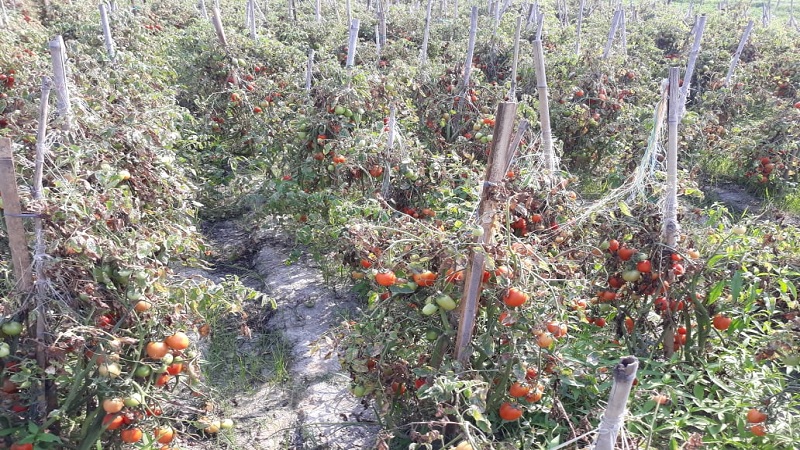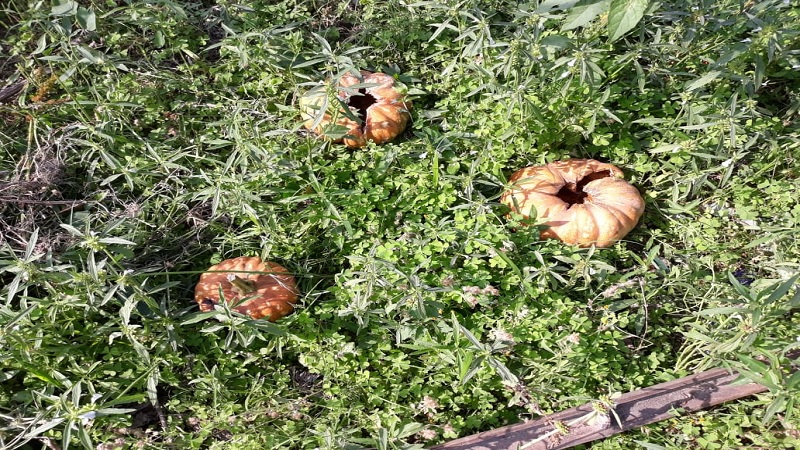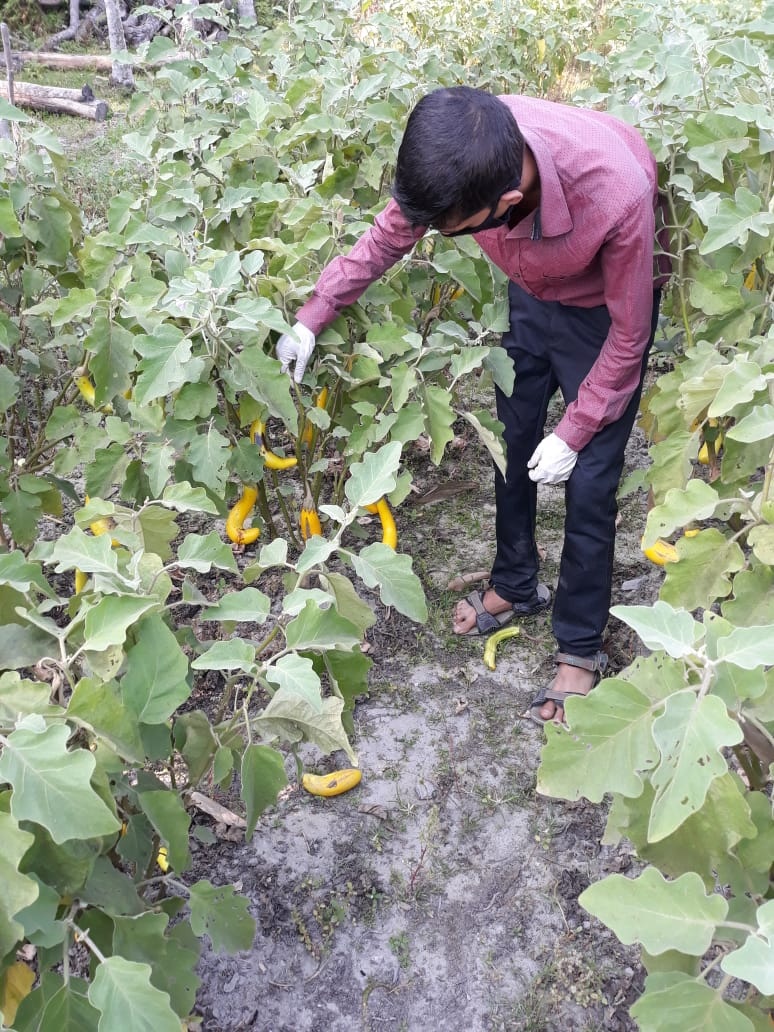 Photo Credit: Piyush Chakraborty, Riju Modak, Krishna Sarker, Muzammel Hoque,
Photo Credit: Piyush Chakraborty, Riju Modak, Krishna Sarker, Muzammel Hoque,
Santhali Adivasis who walk 20-30 kilometres to Bongaigaon, clear the jungle for residents and earn money through this exercise are today left with no earnings after the sudden lock down. Just days ago, a poor and marginalised labourer, Gopal Barman from Goalpara district of Assam has already committed suicide due to acute scarcity of food. For the Santhalis, the indigenous people of Assam, the jungle was rich in food but today, their food crisis is more dire than the horrors of Corona. Community volunteers with the Citizens for Justice and Peace (CJP), in the Bongaigaon district have alerted authorities about these dire conditions while also undertaking relief distribution through community resources.
Farms of tomatoes have been drying up, bigha by bigha, also as a result of the lock down with farmers not being allowed to care for the produce. Ratan Majumdar, a farmer from Chatianguri under the Bijni sub-division of Chirang district said that due to the lock down the crops which are being cultivated on their lands are being systematically destroyed, especially which will cause a lot of real, human and financial damage. Loss of vegetable-fruits like this is criminal at a time when people are hungry for food.
 Photo Credit: Piyush Chakraborty, Riju Modak, Krishna Sarker, Muzammel Hoque
Photo Credit: Piyush Chakraborty, Riju Modak, Krishna Sarker, Muzammel Hoque
Majumdar also said that tomatoes are grown-produced in large quantities in many villages of this district including Chhatianguri, Maneswari. However all these villages have shown the tomatoes withering away due to the sudden shut down of water supply! Farmers in the villages of Matiyapara, Bagorgaon, Koptupuli, Kauwatika, Duturi, Baghmara etc are also helpless, seeing before their own eyes their crop dry up and wither away due to the failure to water the fields!
When interacting with farmers, CJP’s wide network of community volunteers and district volunteers, asks, “Farmer how are you?”(কৃষক তুমি কেমন আছো? /কৃষক তুমি কেনে আছা?)
The results of this empathetic exchange, at a time when there is none to turn to, are revealing. CJP volunteers have been active in the various villages of Lower Assam especially those in the Chirang, Bongaigaon, Kokrajhar, Barapeta and other districts.
CJP’s volunteer from Chirang, Pranay Tarafder visited a village called Kharampara. No farmers were allowed to talk to him or come outside their homes. This, while their fields and the produce shriveled up. A criminal waste of produce.
Similarly, many villages in Kokrajhar district seeing the shriveling up of field upon field growing vegetables! Abdul Hamid, a small, marginalised farmer from the Hawriapet village under Gosaigaon police station in Kokrajhar district, told CJP, “I cultivated cucumber on 1 bigha of land this year. As the time was ripe to sell this cucumber, the lock down was suddenly declared. If we can’t sell vegetables, what we will eat? Will the government help us?”
 Photo Credit: Piyush Chakraborty, Riju Modak, Krishna Sarker, Muzammel Hoque
Photo Credit: Piyush Chakraborty, Riju Modak, Krishna Sarker, Muzammel Hoque
Many other villages of Barpeta district are seeing the similar waste of all their ripe and grown agricultural produce due to absence of a live supply chain open to the markets. Sale of vegetables in large quantities has been unilaterally shut down for the last twenty days. Katajhar village grows large tracts of cucumber. “If the state’s agriculture department does not arrange for purchase and sales, then I too will be at a loss, ” Gokul Ghosh of the village told the CJP team. A similarly bleak situation faces almost farmers in this district. A large number of corn crops are harvested in the Dhubri region of Assam, especially in the Char region. Faced with the turbulence caused by the countrywide lock down, these farmers face a sudden dip in the prices of corn. What will this mean for their sustenance?
 Photo Credit: Piyush Chakraborty, Riju Modak, Krishna Sarker, Muzammel Hoque
Photo Credit: Piyush Chakraborty, Riju Modak, Krishna Sarker, Muzammel Hoque
Bishnupur in Chirang District is known for it’s famed lemon cultivation. This is the area from where the special Assamese lemon is supplied to all over the state, other states in the north-east and even eastern part of Bengal. Many farmers from this area cultivate hundreds of bighas of lemon. Guwahati, the main city of Assam is also dependent upon Bishnupur as it meets the demands of 90% lemon. Though lemons have been harvested, the sudden shut down in communications had ruptured the supply chain. Small portions are being sold: while the price was Rs 1200 per bag before the lock down, this has dropped to Rs 800 per bag, which means a loss of Rs 400 per bag.
The same is the case in Garogaon, Oxiguri, Bhawraguri, Batabari, Ballamguri, Kawatika, Bhetgaon etc villages which is the areas renowned for tomato and chilli cultivation. Farmer Abdul Aziz told the CJP team that he cultivated green chilli on three bighas of land, and in better non lock down times he used sell this produce at Rs 40 per kg. Now the green chilli ready to eat, but there is no way to sell it. The supply chain has been broken.
Large quantities of water melon is grown-produced in the pastures of the Aie river in the Bongaigaon district. Locals have innovative methods of sale: the lawn road at No. 31 National Highway, for one kilometer on both sides of the highway becomes a temporary market for watermelon vendors. The Covid-19 caused lock down has meant a loss of sales and supply, leaving the farmers stranded with the ready crop. A similar situation has arisen for watermelon growers in Balughopa region.
In another part of Bongaigaon district, the Kirtanpara area, people earn their livelihoods on two kinds of occupation. The first is agriculture and the second is cheese and curd production from the fresh cow milk, which is then sold in different cities. With the lock down, farmers’ crops are being destroyed, and accumulation of curd and cheese is causing a wasteful and desperate situation for these producers.
Many milk dealers in Chirang district are also in dire straits today. Particularly for those who sell milk in the sweet shops, the situation is acute as shops are shut due to the lock down. No alternative arrangements have been made by the government to sell milk at this time of crisis. This has added to the despair.
Committed to its Citizenship related para legal and community interventions since 2017, CJP’s team that spans several districts of the has been now completely involved in providing food and ration relief especially to the most deisadvantaged and needy among the people. This work involves creating awareness about the COVID 19 virus, the need for intrepid steps for public distancing, observing the lock down and administrative rules while also at the same time, performing these public tasks: collecting and distributing the relief materials, through our volunteers in different areas.
The results have been painful and worrying. Testimonies of unspeakable hardship have emerged: the poorest people among the people in Assam are battling against hunger, searching for food rather than battling Corona. Food intake has been reduced to days long hunger or just a single meal in a day. The state of Assam is in a state of anarchy and faces worse in the days ahead.
Several persons and organisations are involved in the relief and humanitarian aid operations. These aid workers and volunteers are co-operating with the administration. The administration is trying its best to supply ration needs of those mainly in urban and semi urban centers. Ii is in the most remote areas where the distress is acute: unimaginable dire stories from widows, orphans, children come from there.
In the midst of this crisis, volunteers from CJP have been distributing relief material while following the regulations laid down by the administration for such work during the lock down. Difficulties remain, however. Some volunteers from Kokrajhar have complained of innocent persons being targeted by the administration when in fact they have not been guilty of any violations.
Also, movement to aid workers and volunteers gets hampered because of these very rules. The cries of the farmer in Baksha district is desperate and acutely felt. To alleviate this suffering, CJP has started this outreach and our first step is to ask, “how are you dear farmer?”
Assam faces a double or triple jeopardy caused by COVID 19. Already the state was reeling under the self-inflicted citizenship crisis. Then the fears and precautions caused by the virus. The worst of all of this is however, the condition of hundreds if not thousands of marginalised farmers who cultivate on small land: the cultivation could be tomatoes, brinjal, chilli, watermelon, milk produce.
The refrain is an echo, from farmer after farmer, “Our war is against hunger, much more than Corona.” What will they do? Through CJP they plead: the government takes some measures to waiver or sanctioning new farmers’ loans to protect their lives, must open water supply, must open supply chains of ready vegetable and milk produce to markets. Otherwise, they will die not of disease but of starvation. And, ready to eat good vegetables and milk foods are going waste.
The farmer’s plight is a source of much frustration. As the Adivasis and farmers battle hunger in Assam, the middleman, the grocery shop owner charges exorbitant prices. Why doesn’t the government not crack down on this brazen hoarding and corruption? On the one hand, crops are being wasted or being left to wither and die while at the grocery store, people are compelled to buy vegetables at high prices. The distress of the suffering matches the poor and marginalized that are compelled to pay higher rates for food.
The most heart wrenching sight witnessed by the CJP team was to see, at many homes of farmers, cultivator families boiling brinjals, cauliflower and feeding these to the cows! In the small urban centres, with the acute rise in price of vegetables and other essential food items, the working poor people are compelled to eat rice only with salt.
What can be done? The government needs to step in pro actively and not be paralysed in a state of lock down. The farmer is ready to sell and buy vegetables through a government regulated chain where the benefits go to him and the small consumer who needs to eat. For this the government needs to step in and soon. This way the farmer will get some money as well as the people will not have to bear the extra burden of price rise during this financial downturn.
If the government begins the distribution of rice rations from April 15, CJP volunteers are planning to actually vegetables from the farmer and distribute them to those who need them. If other aid workers and agencies play the same role in a spirit of co-operation, marginalized sections of the Assamese people will be able to eat vegetables with rice.
(The author is the Lower Assam Volunteer Motivator for CJP, Assam)
Related Articles:
1. Lockdown impact: Father of three allegedly commits suicide in Assam
2.Tea industry faces fall in exports, revenues and volumes due to Covid-19 lockdown
